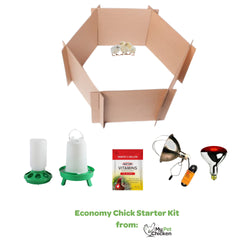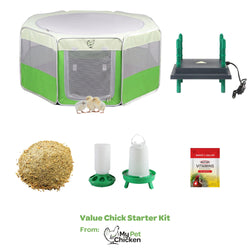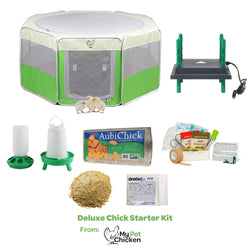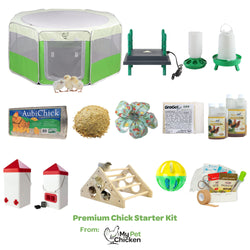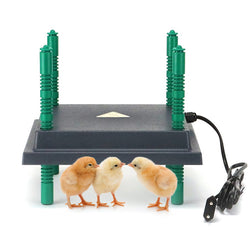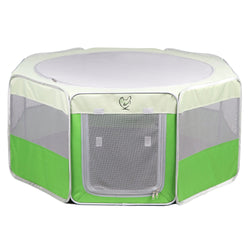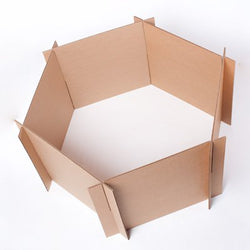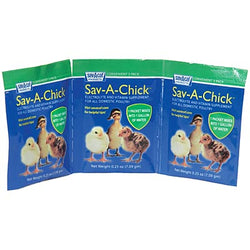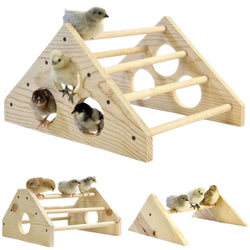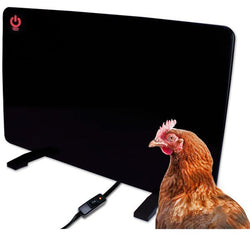Can chickens fly? Will my chickens be able to fly over my fence?
Back to blog
Most heavy, docile backyard breeds don't fly very well and aren't particularly inclined to leave a secure, fenced area. A regular picket fence (if the pickets are close) will do to keep many adult large fowl chickens enclosed.
But that said, a picket fence is probably not going to help you very much for a few reasons. A low picket fence won't work for some breeds--some backyard breeds like Leghorns or Hamburgs are pretty good fliers and will jump fences like they're not even there---and range far! Small or juvenile birds will slip between pickets or wires. And a regular 4 foot fence won't stop many predators, either.
So, if there are large dogs or a busy street on the other side of your fence---or if you keep small breeds or breeds prone to flying---you'll want to add height to your fence or clip chicken wing feathers as an additional precaution. You may want to add extra protection along the bottom so younger or smaller birds don't squeeze through. Even if your flock is not in a dangerous area per se, it can be annoying to neighbors having chickens appear in their yard on on their deck railings, and leave "presents" of chicken poop---and it may be troublesome to you, too, when they do that... or when they discover your tasty fenced vegetable garden!Do keep your animals on your own property. It's just polite.
Typically, docile, large breed "dual purpose" hens cannot fly as well as bantams or smaller, high strung chickens like Andalusians or Penedesencas, for example, so if you plan on keeping big Orpingtons, you may think you can get away with just the fence.
Don't make that mistake. Young pullets, even when they'll eventually be large, heavy breeds, do go through a stage when they have reached their full wingspan (but not their full weight) when they fly higher and more often than they will later when they are older. Most breeds, even heavy breeds, CAN fly a four foot fence if they are motivated. In some cases they'll fly a much higher fence. And if they are being chased by something, for example, ALL breeds are far more likely to try to flee their enclosure!
Flee, chicken, flee! Wait, don't flee.

So what size fence should you use? Really, as high as possible. But keep this in mind:
If their fenced range area is large, your hens may be less inclined to "escape" if there is plenty of room for the number of birds in of your flock. If their yard or run is very small, even breeds that normally tolerate confinement well may be motivated to find their way to the greener grass on the other side. This is especially likely if they have no or little access to good grass or pasture inside the fence, or even if there is plenty of grass, but there are too many roosters and your flock's environment is stressful. They want peace and lots of green, green grass.

That means that if you have birds in a small, barren area, you're going to need very high fences. (But we have to ask: why try to keep your chickens in a small, barren area? Give them space.)
In some cases, hobbyists will clip their chickens' wing feathers to help prevent their leaving the fenced area.
Unfortunately, there is no "pat" answer as to whether your chickens will fly a fence or not, just as there is no "pat" answer that will tell you whether or not a dog will be an escape artist, always trying to jump his fence or dig his way into your neighbors' yard. You will simply want to evaluate how much enclosure your hens need given the nature of your breeds, your pasture, your flock dynamic and so forth. You can reduce the likelihood of wayward hens by getting docile, heavy breeds, and by providing them with lots of space and a stress-free environment.

But that said, a picket fence is probably not going to help you very much for a few reasons. A low picket fence won't work for some breeds--some backyard breeds like Leghorns or Hamburgs are pretty good fliers and will jump fences like they're not even there---and range far! Small or juvenile birds will slip between pickets or wires. And a regular 4 foot fence won't stop many predators, either.
So, if there are large dogs or a busy street on the other side of your fence---or if you keep small breeds or breeds prone to flying---you'll want to add height to your fence or clip chicken wing feathers as an additional precaution. You may want to add extra protection along the bottom so younger or smaller birds don't squeeze through. Even if your flock is not in a dangerous area per se, it can be annoying to neighbors having chickens appear in their yard on on their deck railings, and leave "presents" of chicken poop---and it may be troublesome to you, too, when they do that... or when they discover your tasty fenced vegetable garden!Do keep your animals on your own property. It's just polite.
Typically, docile, large breed "dual purpose" hens cannot fly as well as bantams or smaller, high strung chickens like Andalusians or Penedesencas, for example, so if you plan on keeping big Orpingtons, you may think you can get away with just the fence.
Don't make that mistake. Young pullets, even when they'll eventually be large, heavy breeds, do go through a stage when they have reached their full wingspan (but not their full weight) when they fly higher and more often than they will later when they are older. Most breeds, even heavy breeds, CAN fly a four foot fence if they are motivated. In some cases they'll fly a much higher fence. And if they are being chased by something, for example, ALL breeds are far more likely to try to flee their enclosure!
Flee, chicken, flee! Wait, don't flee.

So what size fence should you use? Really, as high as possible. But keep this in mind:
If their fenced range area is large, your hens may be less inclined to "escape" if there is plenty of room for the number of birds in of your flock. If their yard or run is very small, even breeds that normally tolerate confinement well may be motivated to find their way to the greener grass on the other side. This is especially likely if they have no or little access to good grass or pasture inside the fence, or even if there is plenty of grass, but there are too many roosters and your flock's environment is stressful. They want peace and lots of green, green grass.

That means that if you have birds in a small, barren area, you're going to need very high fences. (But we have to ask: why try to keep your chickens in a small, barren area? Give them space.)
In some cases, hobbyists will clip their chickens' wing feathers to help prevent their leaving the fenced area.
Unfortunately, there is no "pat" answer as to whether your chickens will fly a fence or not, just as there is no "pat" answer that will tell you whether or not a dog will be an escape artist, always trying to jump his fence or dig his way into your neighbors' yard. You will simply want to evaluate how much enclosure your hens need given the nature of your breeds, your pasture, your flock dynamic and so forth. You can reduce the likelihood of wayward hens by getting docile, heavy breeds, and by providing them with lots of space and a stress-free environment.

